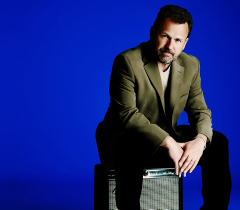Search
Rychard Carrington reports on Martin Simpson – The Junction, Cambridge, 9 November 2009

Right from the opening of the first number (Home Again - a tribute to his native Scunthorpe), one knew one was in the presence of a master. Not just a master guitarist, or even just a master performer, but a truly great man. It's hard, I know, to be effusive in praising folkies, who are so modest by nature; yet a performance such as this really does make one want to pay tribute to folk music in no uncertain terms. For, as always with good folk performers, the greatness of the performer and the greatness of the tradition are essentially one and the same.
Folk has become less unfashionable in recent years, but it's still nearly always marketed as being more exciting really if other, sexier forms of music are mixed in with it. The PR will claim that their man is really more punk than trad in attitude, etc. etc. Well, maybe we've all witnessed oldie-worldie affectations, maybe we've heard too many mediocre guitarists protesting about the First World War, but when folk is in good hands - and that's not so rare - it moves any decent person to the depths of their humanity, transcending all the more modish, flashier values.
Tonight was all that par excellence. Of course folk is essentially an attitude, it doesn't prescribe an exclusively traditional set. We did get Sir Patrick Spens, but also many songs wriitten by Simpson (who has become a fine songwriter), by other contemporary songwriters (Randy Newman's flood song Louisiana 1927, according to Martin now something of an anthem in New Orleans, following Hurricane Katrina), and many of American origin (Simpson lived there for several years). They all fitted perfectly together, with Martin telling the stories behind them in-between.
Simpson played with a band at this year's Cambridge Folk Festival, but, like almost all folk performers and singer-songwriters, he's most powerful on his own, as he was tonight. The guitar-playing was versatile (including slide and banjo), and consistently outstanding. It would have been a great gig if he hadn't sung a word.
Martin played for over two hours in total, including a second encore (Easy Money), that was definitely unscheduled, a response to the clearly deep appreciation of a full-house audience (not bad for a Monday). The first half ended with a medley of Mississippi Fred McDowell's 61 Highway and Bob Dylan's Highway 61 Revisited. Dylan's Boots Of Spanish Leather made an appearance in the second half. Simpson's renditions reminded me of what a great lyricist within the folk tradition Dylan was, but also of what a poor show Dylan put on when I saw him this year at the O2 Arena in London, poor specifically in terms of his lack of communication with the audience. Perhaps Dylan did lose something when he abandoned the folk movement in 1965. Simpson's modest sincerity is so much more mature than Dylan's haughty enigma.
Perhaps the two highlights were Never Any Good, Simpson's tribute to his father, and Chris Wood's Come Down Jehovah. Wood's song brilliantly connects humanism in the atheist sense to humanism in the sense of compassionate affirmation of humanity. This latter humanism seldom feels so alive and vital as at a really good folk concert, such as this was tonight. Thank you Martin.
Writer: Rychard Carrington
Moving Tone interview with Martin Simpson, 2007